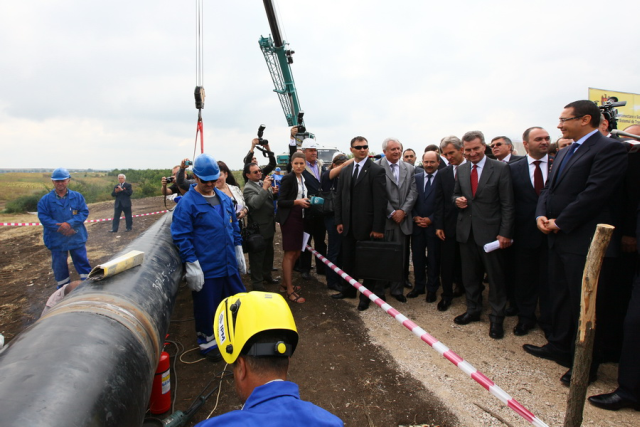Romania Delivers Gas to R. of Moldova
Romania delivers natural gas to Moldova, in order to reduce this countrys reliance on Russian imports.

Bogdan Matei, 04.03.2015, 13:44
Without logistics support, the Republic of Moldova’s pro-European choice would remain purely theoretical. More than two decades since it proclaimed its independence from Moscow, in 1991, Chisinau still depends heavily on Russian hydrocarbons. And the difficult negotiations this week in Brussels, through which the EU secured an agreement between Kiev and Moscow on Russian gas deliveries to the West, via Ukraine, are tale-telling for the strategic importance of natural gas. The so-called gas war, through which Moscow has repeatedly punished both Ukraine for its pro-Western orientation, and Europe for supporting the Ukrainians’aspirations, is a scenario that might be repeated in Moldova at any time.
Built precisely to reduce Chisinau’s reliance on Russian imports, the pipeline connecting the cities of Iasi in Romania and Ungheni in Moldova is operational as of Wednesday. On August 27th, last year, when Moldova celebrated its national day, the Romanian PM Victor Ponta, his Moldovan counterpart Iurie Leanca and the EU Commissioner for Energy, Gunther Oettinger attended the official opening of the pipeline.
Construction works took one year and cost 26 million euros, most of the funds coming from Romania, with the balance covered by the EC. More than half a year after the official inauguration, Romania started to provide gas to the Republic of Moldova. The price, 255 US dollars per thousand cubic meters, is significantly lower than the one charged by the Russian supplier Gazprom, 332 dollars. Over one million cubic meters will reach Ungheni this year, and from there it will be fed into the central network of the Moldovan national supplier, Moldovagaz.
But this will only cover part of the needs of the country. The Government in Chisinau says talks are already underway with foreign partners, regarding the extension of the Iasi-Ungheni pipeline to the capital city. With a capacity of 1.5 billion cubic meters per year, the extended pipeline might cover most of the country’s natural gas demand. But the extension entails costs of over 60 million euros, of which Brussels is only willing to provide 10 million.
Diversifying its energy sources is vital to the future of the Republic of Moldova, the US Deputy Secretary of State Antony Blinken said in his turn, during a visit to Chisinau on Tuesday, when he met Moldova’s President Nicolae Timofti and the new Prime Minister, Chiril Gaburici.






























